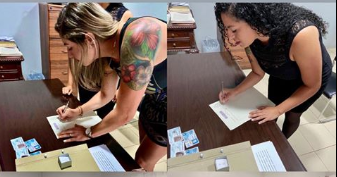Alexandra Castillo and Dunia Araya, 29 and 24, were married eight minutes past midnight on May 26 in Costa Rica. The civil ceremony was broadcast live on the internet. This marked the country’s debut as the first in Central America to legalize same-sex marriage.
Ten days earlier it had been announced that Costa Rica had also joined the OECD, the club of 37 “most developed” countries in the world.
Notary public Ana Cecilia Castro married Castillo and Araya wearing a mask. “I declare you, united in the bond of matrimony, bride and bride,” she said. The ceremony was held outdoors, with the background of the night sounds of nature. Only members of the couple’s most intimate circle attended, following the restrictions imposed by the pandemic. There was a ritual in spite of being a civil wedding: the brides said, “Yes, I do” and exchanged rings.
The entry into force of egalitarian marriage in Costa Rica is an advance for that country and puts it ahead of the curve in a region, Central America, where the LGTBI community is persecuted, as a report by Deustche Welle points out.
“Central America is one of the most dangerous regions in Latin America for the LGBTI community. Homophobic or transphobic killings are unfortunately far from anecdotal in countries such as Honduras, El Salvador or Guatemala. And LGBTI refugees fleeing to safe countries where they can start over is not exactly a bed of roses,” the article says.
In January 2018, the Inter-American Court of Human Rights (IACHR) ordered the State of Costa Rica to guarantee the same rights for people with diverse gender identities. This included same sex marriage and changing one’s name according to the gender identification of the bearer. “To recognize and guarantee all the rights that derive from a family relationship between people of the same sex,” the ruling said, as reported by BBC Mundo.
From 2010 to January 2018, according to La Nación de Costa Rica, a series of court rulings in that country relating to identity documents for people of different sexes, recognition of de facto unions between homosexual couples and the guarantee of economic rights for them had opened the way for the legalization of equal marriage that came into force May 26, 2020.
In August 2018, a Costa Rican constitutional court declared that article 14(6) of the Family Code, which prohibited same-sex marriage, was unconstitutional. That decision endorsed de facto unions between them. In October 2019, the General Council of the Judiciary had also recognized the right to inherit from same-sex couples of civil servants.
The government of Luis Guillermo Solis had requested the IACHR’s opinion in 2016.
As reported by BBC Mundo, the 2018 ruling of this court was also addressed, as a recommendation, to the countries that had signed the American Convention on Human Rights. So far the Latin American countries that allow equal marriage and civil unions between people of the same sex are Argentina, Brazil, Chile, Colombia, Ecuador, Uruguay and some states of Mexico.
Victor Monge, a Costa Rican LGBTI rights activist and co-founder of the organization Movimiento Diversidad, told Deustche Welle that he believes the next to legalize humane marriage in Central America will be Panama and Belize, and that, in addition, “many Latin American same-sex couples could soon find a place in Costa Rica to live out their love under the protection of the law.”
The current president of Costa Rica, Carlos Alvarado Quesada, won the elections just in 2018. The DW report recalls that he beat evangelical pastor Fabricio Alvarado, and that parliamentarians of his ideological line tried, without success, strategies to delay the entry into force of the legalization of equal marriage. According to El Confidencial, Costa Rica’s Constitutional Court had given Congress 18 months to legislate on civil marriage between people of the same sex, or else the articles in the laws that prohibited it would be automatically repealed. That is what happened from May 26.
“Same-sex couples have waited for many decades for their rights to be recognized on an equal footing,” Luis Salazar, the presidential commissioner for the LBGTI population, told AFP.
And Gia Miranda, executive director of the Sí Acepto Costa Rica campaign and platform, added: “A legal change does not imply social change, but it is a huge advance, a wonderful milestone in Costa Rica’s history”.
Sí Acepto Costa Rica published, precisely, on its Facebook page the photos of another union between two women that took place on May 26th, at 2 pm: the civil wedding between Berliotte Barrientos and Guisell Matus.

